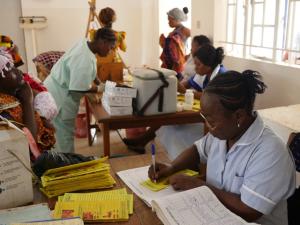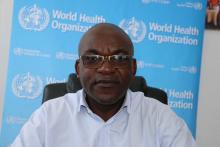On African Vaccination Week, WHO calls for renewed efforts to vaccinate every last child
FREETOWN, April 25, 2018 --- This week, 23rd-29th April, is African and Global Vaccination Week, when the World Health Organization joins partners, health workers and communities across the world to celebrate the critical role of vaccines in promoting child health and survival. The week has been gazetted by world leaders at the World Health Assembly and the African Regional Committee to promote and champion vaccinations, as one of the most important, cost-effective interventions for saving children’s lives, and keeping adults, communities and nations, healthy.
Just over one year ago today in January 2017, African leaders came together to endorse the historic Addis Declaration on Immunization, and pledged to ensure that everyone, everywhere in Africa is able to receive the full benefits of vaccines. It is vital now, more than ever that we stay on track to meet these commitments.
2018 will see the first Vaccination Week celebrated by Sierra Leone’s newly elected government. Significantly, it is also the 20th anniversary of Sierra Leone’s last cases of indigenous wild poliovirus in Kenema and Port Loko districts, and the eighth since its last imported case. It marks the fifth year since the country received its elimination certificate for maternal and neonatal tetanus, a disease known to kill many children in their first four weeks of life, and one full year without a single measles outbreak. These are tangible results brought about by the proven benefits of vaccinations, which have to date protected millions of Sierra Leonean children against various life-threatening and debilitating diseases.
While we celebrate these immense gains, the World Health Organization takes this opportunity to affirm that the fight is not won yet. The benefits of immunization only last as long as all children born in a country, in all districts, in rural and urban areas, of all ethnicities and sexes, are fully vaccinated. WHO notes that although the proportion of children receiving the full dose of childhood immunizations in Sierra Leone remains high, the trend has showed concerning declines over the last five years. The proportion of fully immunized children was 99% in 2013, but dropped to 80% in 2017. As well as incurring health risks for individual children, clusters of unvaccinated children can also quickly increase the likelihood of outbreaks of vaccine preventable diseases. We cannot afford to be complacent.
In Sierra Leone, vaccination coverage is being monitored by each health district. WHO would like to use this African Vaccination Week to call on all districts to ensure that activities continue to ensure that every child, everywhere is vaccinated, and step up efforts to promote and champion routine vaccinations.
This means encouraging parents to maintain their vaccination cards and take every effort to keep their child’s vaccines up to date. We call on parents and communities to take your child to get marklate, five times in the first year and importantly, also at 15 months, when they will receive their second dose of the measles vaccine. All these vaccines are critical to ensure your child and community gets lasting protection against preventable diseases.
We would like to commend the Koinadugu, Kambia, Tonkolili and Kenema District Health Management Teams for outstanding immunization programme performance in 2017. We call on all districts to emulate these efforts, and address gaps in coverage that could hamper critical progress achieved to date. Special thanks too go to all the vaccinators, whose hard work across even the country’s most remote, hard to reach areas continues to show that Sierra Leonean children matter to them.
Lastly, the 2018 African Vaccination Week challenges every immunization stakeholder to do his or her part in championing vaccinations. WHO commits itself to supporting member states in their implementation of the Addis Ababa Declaration, and in Sierra Leone, will continue to support the government in its efforts to advance polio eradication; strengthen routine immunization in health facilities; introduce as appropriate new vaccines; conduct effective surveillance for vaccine preventable diseases, and provide quality assurance for its immunization programmes.
With this pledge, the WHO country office also appeals to:
1. The new government to provide leadership and stewardship towards achieving the targets outlined in the Addis Declaration and other global immunization commitments;
2. All health partners to support innovations and investments for immunization systems strengthening that have been proven successful in other parts of the world;
3. Community and religious leaders to be stewards for advocacy and mass awareness among their constituencies;
4. Councils to hold health authorities accountable for their immunization performance;
5. Civil Society and NGOs to lead the charge on behavior change communications around vaccination, and particularly the importance of routine immunization;
6. Caretakers (mothers and fathers) to ensure that all under-5s in their care receive all the vaccination doses approved and provided by the Ministry of Health and Sanitation.
Vaccines work. We must all do our part to ensure that every child, everywhere, receives the vaccinations they need for a healthy life ahead.
By Alexander Chimbaru
Officer in Charge, WHO Sierra Leone

